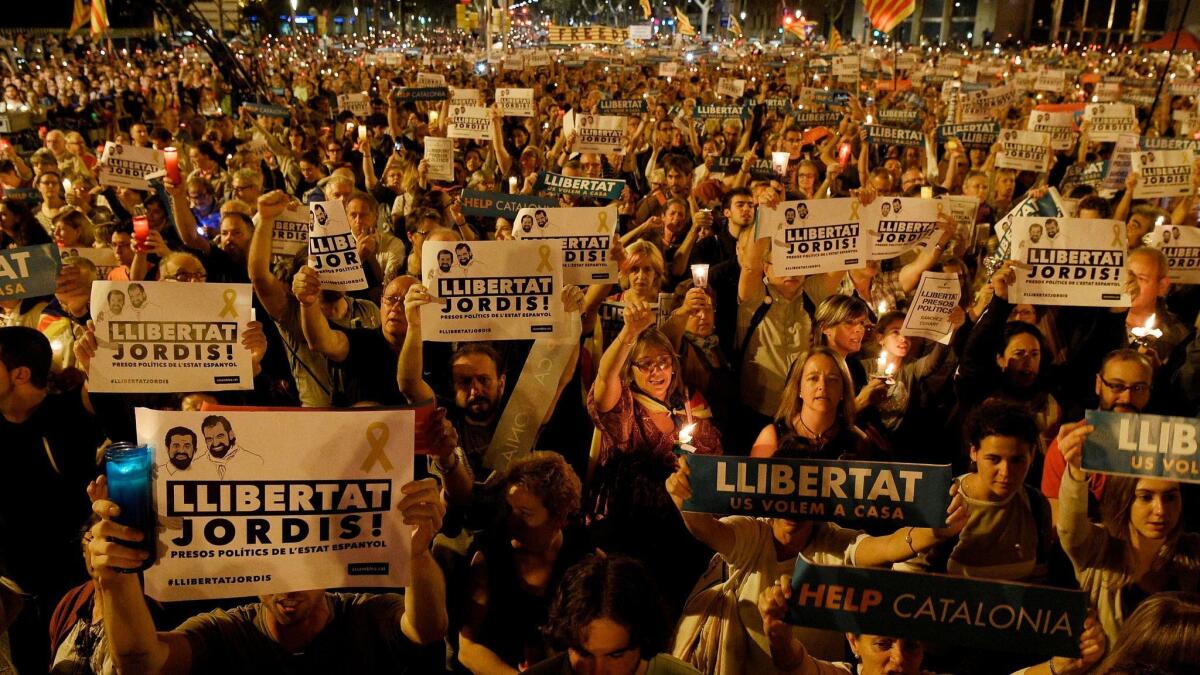Stage set for showdown: Catalonia faces Spanish deadline to drop independence bid or see possible takeover

Spain and Catalonia hurtled toward a potential secession showdown, with the president of the northeastern region facing a Thursday deadline set by the central government to back away from a bid for independence.
Madrid has warned that if Catalonia moves unilaterally to secede, the government of Prime Minister Mariano Rajoy will invoke a never-used provision of Spain’s democracy-era Constitution to impose direct rule on the region, which now enjoys autonomy in some matters.
On the eve of the deadline, neither side showed any signs of budging.
Rajoy, speaking to the Spanish parliament Wednesday, urged Catalan President Carles Puigdemont to “act sensibly.” He called on the region’s leadership to “put the interest of all citizens first” — an explicit reminder that Spain believes the country as a whole should vote on any independence proposal for Catalonia, not the region alone.
Spanish Deputy Prime Minister Soraya Saenz de Santamaria said a failure by Puigdemont to meet the Thursday morning deadline for abandoning a declaration of independence would “provoke the application of Article 155,” the constitutional provision that allows an administrative takeover of any Spanish region by the central government in the event of a serious legal violation.
The constitution was approved in 1978, after the death of dictator Gen. Francisco Franco, whose authoritarian rule spanned four decades.
Catalonia has its own parliament and police force and sets policy on matters such as healthcare and education, but the central government handles matters such as tax collection, border security and external relations.
Catalan leaders, for their part, have repeated calls for dialogue, which Spain says is impossible unless the region first renounces its secession bid. Puigdemont ignored a Monday deadline by Madrid to clarify whether independence was being declared.
Catalonia, a region that is home to 7.5 million people, has its own language and traditions. But despite exercising considerable control over its day-to-day affairs, Catalans have chafed at contributing a disproportionate share of wealth to the central tax coffers. Spain is still struggling to throw off the effects of a financial crisis and sees any independence move not only as a threat to the republic but also as a potentially crushing economic blow.
The European Union, fearful of igniting secessionist movements elsewhere, has sided with Spain’s government in the dispute and ignored appeals from Catalan leaders to step in and shepherd talks. Spain has ruled out international mediation.
The sharpening political confrontation, Spain’s worst in decades, has triggered a wave of corporate flight from Catalonia, and many fear a reprise of the kind of violence seen during the region’s Oct. 1 independence referendum if Madrid moves to strip the regional government of its powers. Hundreds of people were injured when authorities tried to stop the vote, which the Madrid government considered illegal.
Catalan leaders say the referendum showed 90% of voters in favor of breaking with Spain, but the turnout was less than half of those eligible to cast a ballot.
Catalonia has also been the scene of street protests over Spanish authorities’ detention of two separatist leaders, Jordi Sanchez and Jordi Cuixart, who are being investigated for sedition. The two men helped orchestrate the referendum.
Puigdemont told the regional parliament last week that the referendum result gave Catalonia the right to secede, but said he was suspending the outcome and calling for dialogue. That ambiguous stance angered both the Spanish government and those in Puigdemont’s political camp who favor formally setting out a “road map” for breaking away from Spain.
If Rajoy moves to implement Article 155, a step that would require approval of Spain’s Senate, which is controlled by his party, he would have a range of options at his disposal.
Spanish news reports have suggested that a potential central government takeover could involve asserting control over Catalonia’s finances, its Interior Ministry and its regional police force. Rajoy could also move to disband the current regional government and call for new Catalan parliamentary elections.
Twitter: @laurakingLAT
More to Read
Start your day right
Sign up for Essential California for news, features and recommendations from the L.A. Times and beyond in your inbox six days a week.
You may occasionally receive promotional content from the Los Angeles Times.






